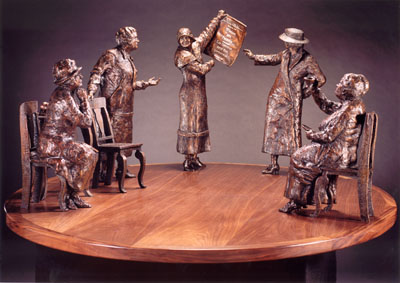The “Famous Five” were the women behind the Persons Case. It was a constitutional ruling. It established the right of women to serve in the Senate. It ruled in 1929 that women were persons in the eyes of the law. The case was started by the Famous Five. They were a group of women activists. They were led by justice Emily Murphy. The other women were Henrietta Muir Edwards, Nellie McClung, Louise McKinney and Irene Parlby. The five had been working for women’s rights since the 1880s and 1890s.
This article is a plain-language summary of the Famous Five. If you are interested in reading about this topic in more depth, please see our full-length entry: Famous Five.

Background
In 1922, female activists proposed Emily Murphy, Canada’s first woman judge, for a Senate position. Many newspapers and women’s groups championed her cause. But the government said that “the British North America Act made no provision for women.”
Petition
On 27 August 1927, Emily Murphy, Nellie McClung, Irene Parlby, Louise McKinney and Henrietta Muir Edwards sent a petition to the governor general. They did so under section 60 of the Supreme Court Act. It allows a group of five persons to ask that the Supreme Court interpret a point of law in the BNA Act. The petition asked the Court to rule on whether “person” in section 24 of the BNA Act included female persons.
Supreme Court Ruling
On 24 April 1928, the Supreme Court of Canada ruled unanimously that women were not “persons” under section 24 of the BNA Act. The decision was based on the premise that the BNA Act had to be read the same way in 1928 as in 1867. The justices said that the BNA Act would have specifically referred to women if it had meant for them to be included.
Privy Council Ruling
There was one higher authority to which the Famous Five could appeal. At the time, the Judicial Committee of the Privy Council was Canada’s highest court of appeal. On 18 October 1929, the Privy Council reversed the decision of the Supreme Court. It concluded that “the word ‘persons’ in sec. 24 does include women.” It also found that women are eligible to become members of the Senate.
Significance
The Persons Case was a significant milestone in the history of women’s rights. The decision legally recognized women as “persons.” Women could no longer be denied rights based on narrow readings of the law. Women could continue to work for greater rights through both the Senate and the House of Commons.
Legacy
In 1929, the media called the group the “Alberta Five.” Over time, they became known as the “Famous Five.” They have been seen as symbols of women’s political progress, and of human rights in general.
But they have also been the subjects of controversy. Some have criticized the group as racist and elitist. This is due to their support for eugenics. They supported laws that led to the forced sterilization of thousands of people. A high number of them were Indigenous women.
The Famous 5 Foundation was founded on 18 October 1996, the 65th anniversary of the Persons Case. Its mandate is to “empower women and girls to courageously lead change that contributes to a society without boundaries for women.” A bronze statue called Women Are Persons! was unveiled in Calgary on 18 October 1999 and in Ottawa on 18 October 2000.
See also Persons Case (Plain-Language Summary); Emily Murphy (Plain-Language Summary); Women’s Suffrage (Plain-Language Summary).


 Share on Facebook
Share on Facebook Share on X
Share on X Share by Email
Share by Email Share on Google Classroom
Share on Google Classroom






